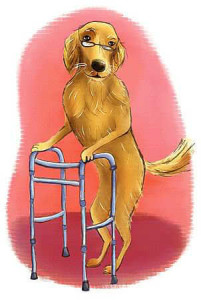
For senior pet owners with their fur buddies experiencing terminal illness, the American Veterinary Medical Association (AVMA) suggests veterinary hospice care. This veterinary practice gives the care and companionship necessary for animals suffering with a terminal condition, essentially to prepare them for the passing away of these beloved pets. The terminally ill dog will be provided comfort and pallative care. Before deciding if hospice senior dog care is for you and your pet, you should consider the following factors:
1. An important consideration before turning to veterinary hospice care is the family or household dynamics. The veterinarian must confer with the clients regarding the animal’s illness and the expected outcome. The responsibilities of the veterinarian must be carefully outlined as well.
2. Before hospice care is considered, the fees must be discussed by the client and the veterinarian.
3. Pallative care is a primary consideration. The animal must be free from pain as much as possible and placed in sanitary care. The hospice team should administer the needed analgesics and must be able to give the owners proper routine care. Constant communication and regular visits must be done by the veterinarian.
4. Before you turn to veterinary care, make sure that they have a Drug Enforcement Administration and the appropriate state license. They must likewise have records of all the drugs and supplies that they give.
10 Senior dog care tips
5. Veterinary staff should be part of the veterinary hospice team. Insurance coverage for staff must be considered, and should include liability and travel coverage. The latter is important if staff members will be traveling to and from the client’s residence.
6. Clients should be advised, preferably before the animal dies, of their options concerning care of the animal’s remains.
7. In the case of home deaths, clients may need confirmation of death through absence of vital signs or pronouncement of death by the attending veterinarian.
8. Euthanasia service should be available if the client and veterinarian at any time believe this service is appropriate. If clients are to be present, they should be informed of the events involved in euthanasia prior to their occurrence. Clients may need time alone with the deceased companion animal. Read more here.
9. Veterinary care should ideally be available all the time, including the availability for emergency care, advice, or euthanasia after regular hours. This must be clear from the onset.
10. There should also be a team approach—an all-encompassing professional care that not only addresses the physical needs but also focuses on psychosocial care.
Leave a Reply